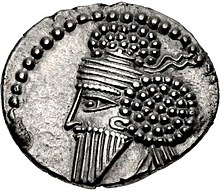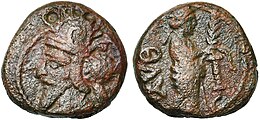Osroes I
| Osroes I 𐭇𐭅𐭎𐭓𐭅 | |
|---|---|
| King of Kings | |
 Silver coin of Osroes I,Ecbatanamint | |
| King of theParthian Empire | |
| 1st Reign | 109–116 |
| Predecessor | Pacorus II |
| Successor | Parthamaspates |
| 2nd Reign | 117–129 |
| Predecessor | Parthamaspates |
| Successor | Vologases III |
| Died | 129 |
| Issue | Parthamaspates |
| House | Arsacid dynasty |
| Religion | Zoroastrianism |
Osroes I(also spelledChosroes IorKhosrow I;Parthian:𐭇𐭅𐭎𐭓𐭅Husrōw) was aParthiancontender, who ruled the western portion of the Parthian Empire from 109 to 129, with a one-year interruption. For most of his reign he contended with the rival kingVologases III(r. 110–147) who was based in the eastern provinces. In 116, Osroes I was briefly ousted from his throne atCtesiphonduring an invasion by Roman emperorTrajan(r. 98–117), who installed Osroes' son,Parthamaspates.After Trajan's death the following year, Osroes I's rule was reinstated by the Parthian nobility. In 129, he was removed from power by Vologases III.
Biography[edit]
In 109, Osroes I revolted against Parthian kingPacorus II(r. 78–110) in order to claim the throne for himself.[1]During the reign of Pacorus II's sonVologases III(r. 110–147), Osroes I managed to seize the western part of the empire, includingMesopotamia,while Vologases III ruled in the east.[2][3]In 113, Osroes I violated theTreaty of Rhandeiawith theRomansby deposing Vologases III's brotherAxidaresand appointing the latter's brotherParthamasirisas the king ofArmenia.[2][4]This gave the Roman emperorTrajan(r. 98–117) thepretextto invade the Parthian domain and take advantage of the ongoing civil war between Vologases III and Osroes I.[2][3]In 114, Trajan conquered Armenia and turned it into a Roman province.[4]In 116, Trajan capturedSeleuciaandCtesiphon,the capitals of the Parthians.[5]Trajan even reached as far as thePersian Gulf,where he forced the Parthian vassal ruler ofCharacene,Attambelos VII,to pay tribute.[6][7]Fearing a revolt by the Parthians, Trajan installed Osroes I's sonParthamaspateson the throne at Ctesiphon.[6][8]During his expedition, Trajan captured a daughter of Osroes I, who remained a Roman captive until the peace treaty concluded between the two powers in 129.[9]

The gains of Trajan were short-lived. Revolts occurred in all the conquered territories, with theBabyloniansandJewspushing the Romans out of Mesopotamia, and the Armenians under Sanatruk causing the Romans problems.[10]After Trajan's death in 117, the Parthians removed Parthamaspates from the throne and reinstated Osroes I.[6]Trajan's successor,Hadrian(r. 117–138) renounced the remnants of Trajan's conquests in the east, and acknowledged theTreaty of Rhandeia,with the Parthian princeVologasesbecoming the new king of Armenia.[11]The weakened state of the western part of the Parthian Empire gave Vologases III (whose eastern domains were untouched) the opportunity to regain lost territory seized by Osroes I.[3]In 129, Vologases III finally managed to remove Osroes I from power.[1][12]
Coinage[edit]

On the obverse of his silvercoins,Osroes I is portrayed with his hair inbunches,whilst wearing adiadem.[13]On his bronze coins, however, he is portrayed with atiarawith hooks and a horn on the side.[13]The coins of Osroes I closely resembles that of his namesake, theElymaisrulerOsroes,which has led to scholars to suggest that they might have been the same person.[14][15]Another possibility is that the Elymais ruler Osroes copied the coinage of Osroes I of Parthia.[14][15]
References[edit]
- ^abDąbrowa 2012,pp. 176, 391.
- ^abcDąbrowa 2012,p. 176.
- ^abcGregoratti 2017,p. 133.
- ^abChaumont 1986,pp. 418–438.
- ^Dąbrowa 2012,p. 176;Gregoratti 2017,p. 133;Kettenhofen 2004
- ^abcKettenhofen 2004.
- ^Hansman 1998,pp. 363–365.
- ^Bivar 1983,p. 91.
- ^Madreiter & Hartmann 2020,p. 9.
- ^Gregoratti 2017,p. 133;Chaumont 1986,pp. 418–438;Dąbrowa 2012,p. 176
- ^Badian 2002,p. 458;Chaumont 1986,pp. 418–438;Dąbrowa 2012,p. 176
- ^Kia 2016,p. 203.
- ^abOlbrycht 1997,p. 33.
- ^abHansman 1998,p. 373-376.
- ^abRezakhani 2013,p. 775.
Sources[edit]
- Badian, Ernst (2002)."Hadrian".Encyclopaedia Iranica, Vol. XI, Fasc. 4.p. 458.
- Bivar, A.D.H. (1983). "The Political History of Iran Under the Arsacids". InYarshater, Ehsan(ed.).The Cambridge History of Iran, Volume 3(1): The Seleucid, Parthian and Sasanian Periods.Cambridge: Cambridge University Press. pp. 21–99.ISBN0-521-20092-X.
- Chaumont, M. L. (1986)."Armenia and Iran ii. The pre-Islamic period".Encyclopaedia Iranica, Vol. II, Fasc. 4.pp. 418–438.
- Chaumont, M. L.; Schippmann, K. (1988). "Balāš".Encyclopaedia Iranica, Vol. III, Fasc. 6.pp. 574–580.
- Dąbrowa, Edward (2012). "The Arsacid Empire". InDaryaee, Touraj(ed.).The Oxford Handbook of Iranian History.Oxford University Press. pp. 1–432.ISBN978-0-19-987575-7.Archived fromthe originalon 2019-01-01.Retrieved2019-01-13.
- Gregoratti, Leonardo (2017). "The Arsacid Empire". In Daryaee, Touraj (ed.).King of the Seven Climes: A History of the Ancient Iranian World (3000 BCE - 651 CE).UCI Jordan Center for Persian Studies. pp. 1–236.ISBN9780692864401.
- Hansman, John F. (1998). "Elymais".Encyclopaedia Iranica, Vol. VIII, Fasc. 4.pp. 373–376.
- Kettenhofen, Erich (2004)."Trajan".Encyclopaedia Iranica.pp. 418–438.
- Kia, Mehrdad (2016).The Persian Empire: A Historical Encyclopedia.ABC-CLIO.ISBN978-1610693912.(2 volumes)
- Madreiter, Irene; Hartmann, Udo (2020)."Women at the Arsacid court (draft)".E. Carney / S. Müller, the Routledge Companion to Women and Monarchy in the Ancient Mediterranean:1–15.
- Olbrycht, Marek Jan (1997)."Parthian King's tiara - Numismatic evidence and some aspects of Arsacid political ideology".2:27–61.
{{cite journal}}:Cite journal requires|journal=(help) - Olbrycht, Marek Jan (2016)."The Sacral Kingship of the early Arsacids. I. Fire Cult and Kingly Glory":91–106.
{{cite journal}}:Cite journal requires|journal=(help) - Rezakhani, Khodadad(2013). "Arsacid, Elymaean, and Persid Coinage". In Potts, Daniel T. (ed.).The Oxford Handbook of Ancient Iran.Oxford University Press.ISBN978-0199733309.
